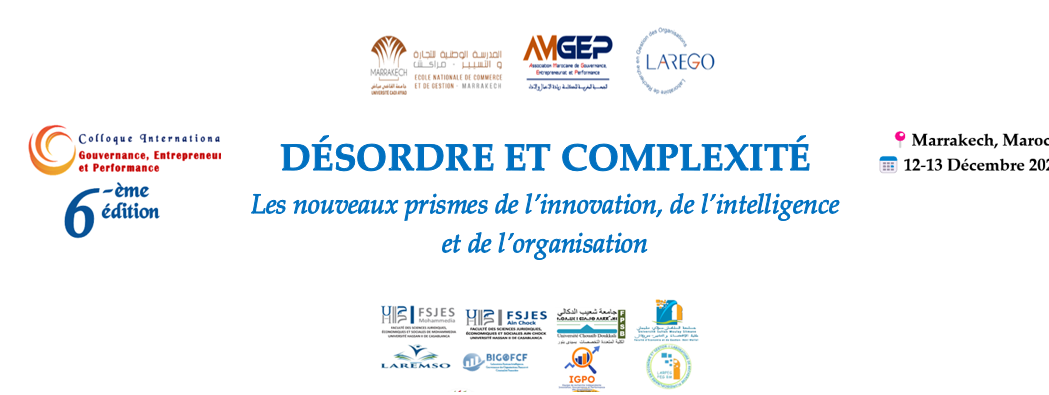
Background
Since the emergence of the first forms of structured organization, the human and social sciences have sought to make sense of the mechanisms of order, control, hierarchy, and rationality that govern collective dynamics. At the heart of these concerns, theories of organization, management, economics, and sociology have long focused on the idea that performance, stability, and efficiency depend on a carefully managed balance between structure and action.
However, recent developments of societies and technologies have fascinated this paradigm of rational control. The advent of digital technology, the rise of artificial intelligence, successive crises, geopolitical upheavals, and energy transitions have transformed the organizational environments, which characterized by instability, unpredictability, and even chaos. In this VUCA[1] context, organizations are obliged to rethink their management practices to face the environment’s volatility, uncertainty, complexity and ambiguity.
Organizational theory shows that organizations are far from being fully rational or orderly entities. They are shaped by power dynamics; informal routines, resistance, and contradictions making disorder an inherent component of the organization functioning. In uncertain environments, some organizations, such as startups or NGOs, learn how to control chaos. Approaches rooted in complexity theory, systems thinking, and innovation studies provide valuable tools to understand these dynamics, encouraging attitudes of openness, adaptability, and co-evolution.
Rethinking complexity and disorder also entails reinventing research methodologies. Archaic linear and predictive models are increasingly changed by interactive and exploratory approaches (Dortier, 2012) that seek not to reduce reality, to simplified frameworks, but to engage with its fluid and evolving nature. Methods such as ethnography, simulations, speculative design, and systems analysis embrace this complexity. The goal is to develop a deeper understanding of reality in order to act with discernment, adopting a reflective and ethically grounded posture.
This 6th edition of the International Colloquium on Governance, Entrepreneurship, and Performance aims to launch cross-disciplinary debate and fruitful exchange about the theme of disorder and complexity within the millennium organizations and structures. This edition concerns researchers belonging to the different research domains, professionals, as well as decision-makers, to collectively examine the challenges faced by the new organizational forms in this context fascinated by disorder, complexity, and dynamism.
Research topics
- 1. Hybrid Management and Innovation: Between Established Order and Necessary Flexibility
In an era where uncertainty has become the norm, organizations are moving beyond rigid models to embrace more fluid structures—agile enterprises, collaborative platforms, and so-called "liquid" organizations. This shift raises a central question: How can autonomy and oversight, freedom of action and control mechanisms, be reconciled with in environments that are often ambiguous, unstable, or even chaotic?
- 2. Chocs économiques et recomposition des organisations
Economic shocks, whether local or systemic, disrupt established balances. How do organizations — small, large, or emerging — respond to such upheavals? What fundamental adjustments do they make to their business models? These crisis contexts often drive deep, unexpected, and sometimes creative transformation.
3. Digital Technologies, Unintended Uses, and Growing Complexity*
Technologies — AI, platforms, information systems — do more than provide structure: they also generate vagueness, proliferation, and ambiguity. Its real uses sometimes diverge from initial intentions, giving rise to informal practices, "shadow IT," and even innovation through bypassing. Can we speak of a form of creative chaos? And how do organizations manage it?
4. Renewable Energy and Organizational Reconfiguration
The energy transition extends far beyond technical considerations. The intermittent nature of renewable, their geographic embeddedness, and their disruptive effects on value chains necessitate fundamental rethinking of organizational models. This raises critical questions: What governance frameworks can effectively address this energy instability? And how are public and private actors adapting to this fluid, evolving paradigm?
5. Individuals and Meaning-Making in Destabilized Environments
When reference points begin to falter, individuals may also lose their footing. Structural or mandatory disorganization — has direct effects on professional identities, motivation, and even psychological well-being at work. How can a collective direction be maintained when individual trajectories are disrupted? What insights do work psychology, sociology, or anthropology offer on these meaning-making dynamics?
6. Organizational Cultures, Marginal Spaces, and Informal Innovation
Within the gaps of formal organizations, there exist spaces of freedom, unofficial rituals, and improvised practices. These grey areas, often hidden from view, are also spaces of creation. What happens when routines are subverted, when rituals evolve? Can this be seen as another form of innovation — less regulated, yet equally fertile?
7. Innovation Ecosystems:GoverningUncertainty
Contemporary innovation structures (incubators, clusters, third-places) unite diverse actors under fluid logics. How to coordinate without centralization? What governance models emerge in these hybrid spaces where coopetition, adaptive partnerships, and transversal approaches now dominate?
8. Automation, Algorithms, and Power Reconfiguration
As algorithms permeate decision-making, human roles are redefined. Who truly decides? In this context marked by disintermediation, enhanced surveillance, and bias risks, organizations must rethink of each actor in this context of digital (dis)order.
9. Territories, Energy and Social Innovation
Innovative energy/tech projects often face local resistance. These conflicts reveal societal fractures but also collective inventiveness—sometimes social/political disorder itself catalyzes social innovation.
10. Methodologies for understanding Complexity
How to study non-linear, unpredictable realities? Qualitative, ethnographic, systemic, and simulation approaches capture emergent dynamics, bifurcations, and uncertainty. Contemporary organizational analysis requires embracing turbulence, ambiguity... and the unexpected.

